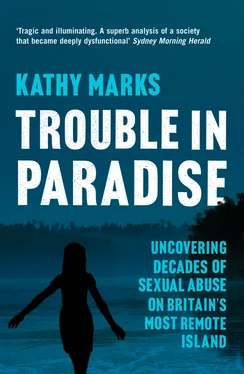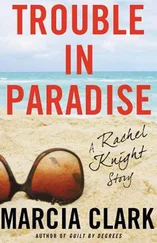While they enjoyed sampling the local cuisine and learning new sports such as Pitcairn rounders, the lawyers had serious business on the island. At a public meeting soon after he arrived, Simon Moore explained the role of a public prosecutor, emphasising that his job was to serve the islanders’ interests. Privately he was optimistic that the men would plead guilty, enabling the matter to be settled with minimum damage to family relationships. The locals warmed to Moore, a man of considerable natural charm. But, according to one person present, ‘they didn’t get it … They saw him as their friend, even the suspects did. When he talked about the good of the island, they thought that meant that nothing would happen to them, whereas he was talking about the law being upheld.’
Moore had been told there was a widespread belief that the alleged crimes were minor, even though police had spelt out exactly what they were investigating. At the meeting, therefore, he took care to stress that some of the offending was exceedingly serious. ‘I could see some of the older people gasp,’ he says, ‘and I was told later that a number of islanders were quite upset.’
During their stay, he and Christine Gordon spoke to nearly every Pitcairn resident. Many expressed fears for the community’s future if men were imprisoned. But no one suggested that the allegations were untrue, and the overwhelming message the lawyers received was that prosecutions ought to go ahead. This was unexpected, since the islanders had previously resisted the notion that sexual abuse even existed, let alone needed to be tackled. Yet according to Moore, ‘The feeling was, if these are crimes elsewhere in the world, then we shouldn’t be treated differently. That came through really loud and clear. It was also said that if they would attract prison sentences elsewhere, then Pitcairn should be no exception.’
Only one person dissented, and that was Len Brown. Len was concerned because, as he saw it, women were hopeless in the longboats. In his quaintly accented English, he told Moore, ‘The island will be doomed, Si- mon .’
Never before in his long career had Moore had ‘a more profound feeling of the difficulty and significance of the decision we had to take’. It was not until February 2002 that he finally made up his mind. The prosecution would go ahead. He informed the community in a videotaped message that reached the island in May. Moore said he would not be laying charges, however, until the vexed issue of a trials venue had been resolved.
Faced with an indefinite period of limbo, the Pitcairners decided it was time to fight back.
In August 2002 the New Zealand Herald ran an article across two pages, quoting three ‘former Pitcairn Islanders’ living in Auckland. The three said that their cousins on the island were frustrated by the media coverage, which in their opinion was based exclusively on information from the British. One of the interviewees, ‘Alex’, who revealed that he had been questioned by police, suggested that Britain was trying to rid itself of its financial obligations. He also told the Herald that, on Pitcairn, teenage sex was common and even some ten-year-olds were sexually active. His companion, ‘Sarah’, said that Britain was partly to blame for this, as it had failed to provide the Pitcairners with guidance. The third interviewee, ‘Mary’, claimed the islanders could not be judged as if they lived in New Zealand. ‘Different countries have their own way of life,’ she explained.
This article, presenting the child abuse case as a David and Goliath contest, set the tone for the way it was reported until the trials two years later. Almost every news report reproduced the Pitcairners’ claims of a culture of under-age sex, and a plot by Britain to shut down the island. It was the mutineers’ descendants versus the big bad colonial power—and the fact that the alleged victims were Pitcairners too, with an equally impeccable lineage, was rarely mentioned.
From mid-2002 the islanders were able to use email, and they joined the propaganda campaign, corresponding regularly with their supporters and with journalists whom they believed to be sympathetic. They also bombarded Richard Fell, who had replaced Martin Williams as the British Governor, with angry emails.
Meanwhile, the other parties were quiet. Simon Moore was unwilling to comment until charges were laid, British officials were cautious, and police were not talking. Neither were the complainants, of course. As for those Pitcairners who, as it later turned out, were horrified by the men’s alleged behaviour, such as Pawl Warren and Brenda Christian, they were keeping their own counsel.
That left the accused men and their families in a position to monopolise the debate, and to assert, without fear of contradiction, that Britain was getting itself into a lather about youthful canoodling behind the coconut palms. The men, who had not yet been named, made public statements about the case, with few outsiders aware that they had their own agenda. ‘Alex’, for instance, was Brian Young, later to be charged with serious sexual offences. ‘Sarah’ was his Norwegian-born wife, Kari, who had lived with him for 15 years on Pitcairn.
Steve Christian did not bother with pseudonyms. Instead, he exploited his position as mayor to attack the British government and the prosecution. He did not disclose—and few people outside the island realised—that he was himself directly affected by the legal action. Another man in his situation might have stepped down. Not Steve. Already in October 2000, shortly after being interviewed by police, he had flown to London for a gathering of leaders of the British Overseas Territories. Baroness Scotland was among seven British ministers who attended the meeting, which included drinks parties and official receptions. Steve also travelled to Chicago in his official capacity, and in May 2002, soon after Simon Moore’s announcement that he planned to lay charges, gave a speech to a United Nations seminar in Fiji on decolonisation. Steve inveighed against the delays in the criminal case, calling them ‘an abuse of process’, and criticised Britain for neglecting the island and its infrastructure. ‘Must we hijack a yacht, or be invaded like the Falklands, to get attention?’ he inquired theatrically.
On his way home via New Zealand, Steve was due to see Richard Fell, a courteous, unflappable man who had become the islanders’ principal bête noire . When Fell refused to allow him to bring a lawyer, the meeting was cancelled. Steve called it ‘yet another example of the pattern of high-handed behaviour exhibited by the Governor’s office’.
He did not seem worried about the impending prosecution. ‘I think Steve thought that nothing was going to touch him,’ says one British official.
A key figure behind the scenes was Leon Salt. In theory, the Commissioner was just a British employee; in practice, he was enormously powerful. He ordered supplies for the islanders, and arranged for them to be delivered. He organised passenger berths on container ships. All mail to and from Pitcairn passed through Salt’s hands, as did email messages, via a central server in his Auckland office.
Salt—tall and rangy, with long, curly hair and a big moustache—had Pitcairn blood; he was well educated, somewhat alternative in his lifestyle. He owned a smallholding north of Auckland and had a passion for vintage cars. He was fiercely attached to the island and its inhabitants, having spent three years teaching on Pitcairn before becoming Commissioner in 1995. He knew the individuals, their relationships, their feuds and affairs. He knew precisely how the tiny, squabbling community functioned.
While some locals saw the softly spoken Salt as their champion, others claim that he favoured certain families, particularly Steve Christian’s. If Steve wanted an item loaded onto the next ship leaving Auckland, it would get on, some islanders say, at the expense of goods belonging to others. Leon Salt was good friends with Steve, who called him ‘Boss’, and with Steve on Pitcairn and Salt in Auckland, it is said, the pair ran the island between them. In 2002 they deported an English journalist, Ben Fogle, who had arrived by yacht. Salt, who was visiting, spat at Fogle’s feet and would not permit him beyond The Landing. ‘We don’t want your sort spying on us,’ he told him.
Читать дальше












